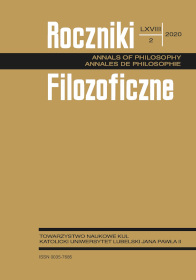The Epistemic Significance of Current Clear and Distinct Perceptions in Descartes’ Epistemology
The Epistemic Significance of Current Clear and Distinct Perceptions in Descartes’ Epistemology
Author(s): Przemysław GutSubject(s): Philosophy, History of Philosophy, Epistemology, Renaissance Philosophy, Early Modern Philosophy
Published by: Towarzystwo Naukowe KUL & Katolicki Uniwersytet Lubelski Jana Pawła II
Keywords: current clear and distinct perceptions; knowledge; Cartesian Circle
Summary/Abstract: In this article, I discuss the epistemic role that Descartes believed was played in knowledge construction by current clear and distinct perceptions (the ideas or propositions which appear most evident to us when we are attending to them). In recent literature, we can find two interpretations about the epistemic status and function of current clear and distinct perceptions in Descartes’ epistemology. The first may be called the psychological, the second normative. The latter states that current clear and distinct perceptions are utterly immune to all doubt, even before God’s existence is proven and the general rule of truth is established. Thus, their certainty is for Descartes not merely psychological, but normative. I endorse the normative interpretation for a number of what I believe to be cogent reasons. However, there are also some difficulties with it. Therefore, after presenting positive arguments for the interpretation (sections I–IV) I discuss the difficulties of textual and substantive nature that the normative interpretation needs to address if it is to be upheld (sections V–VI).
Journal: Roczniki Filozoficzne
- Issue Year: 68/2020
- Issue No: 2
- Page Range: 87-118
- Page Count: 32
- Language: English

